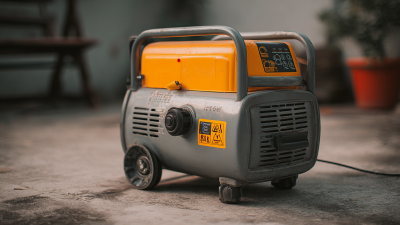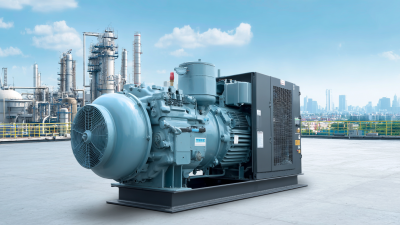 24 Hour Service
24 Hour Service- 800.825.3222
- Now Hiring
- Request A Quote
Blog
Ultimate Guide to Choosing the Best Scroll Air Compressor for Your Business Needs
 In the competitive landscape of modern industry, selecting the right equipment is crucial for operational efficiency and cost-effectiveness. Among various options, the scroll air compressor stands out due to its reliability and low maintenance needs. According to a recent report by Research and Markets, the global air compressor market is expected to reach $40 billion by 2027, with a significant portion attributed to advanced models like scroll compressors. These systems provide a quiet and energy-efficient solution, making them ideal for businesses aiming to reduce operational noise and power consumption. As industries increasingly prioritize sustainability and efficiency, understanding the nuances of choosing the best scroll air compressor tailored to specific business needs becomes imperative for enhancing productivity and maintaining a competitive edge.
In the competitive landscape of modern industry, selecting the right equipment is crucial for operational efficiency and cost-effectiveness. Among various options, the scroll air compressor stands out due to its reliability and low maintenance needs. According to a recent report by Research and Markets, the global air compressor market is expected to reach $40 billion by 2027, with a significant portion attributed to advanced models like scroll compressors. These systems provide a quiet and energy-efficient solution, making them ideal for businesses aiming to reduce operational noise and power consumption. As industries increasingly prioritize sustainability and efficiency, understanding the nuances of choosing the best scroll air compressor tailored to specific business needs becomes imperative for enhancing productivity and maintaining a competitive edge.
Factors to Consider When Exploring Scroll Air Compressor Alternatives
When exploring alternatives to traditional scroll air compressors, several critical factors must be considered to ensure you choose the best option for your business needs. Efficiency is paramount; according to a report by the International Energy Agency, compressed air systems can account for up to 30% of a facility's energy consumption. Opting for scroll compressors, known for their energy efficiency, can reduce operational costs significantly. Their design minimizes energy loss, offering up to 12% more efficiency compared to reciprocating compressors, a crucial consideration for businesses aiming to optimize energy use.

Another factor to weigh is the noise level of the compressor, particularly if operations are situated in noise-sensitive environments. Industry data indicates that traditional compressors can generate sound levels exceeding 100 dB, posing potential distractions and compliance issues. In contrast, scroll air compressors typically operate at levels around 60-70 dB, making them a more suitable alternative for settings where noise reduction is essential.
Additionally, maintenance requirements are pivotal; scroll compressors have fewer moving parts, resulting in lower maintenance costs and downtime, further enhancing productivity overall. These considerations can guide businesses in making informed decisions that align with operational goals and budgetary constraints.
Comparing Scroll Air Compressors to Piston Compressors
When assessing the best air compressor for your business, a crucial comparison lies between scroll air compressors and their traditional piston counterparts. Scroll compressors operate using a mechanism that compresses air through the orbital motion of two spiral elements, providing a more continuous flow of air and less pulsation. This design results in lower noise levels—often around 60 dBA—making them an ideal choice for environments that require quieter operation, such as hospitals and laboratories.
Data from the Compressed Air and Gas Institute indicates that scroll compressors also exhibit higher energy efficiency, rated typically between 10 to 20% more efficient than piston compressors. This is particularly significant considering that energy costs account for up to 80% of the total lifecycle costs of air compressors. Moreover, scroll compressors require less maintenance, as they have fewer moving parts and eliminate the need for oil in many models, leading to cleaner air output. For businesses that prioritize reliability and operational efficiency, the choice between scroll and piston compressors can significantly impact both performance and cost-effectiveness.
Innovative Options: Alternative Technologies in Air Compression
When selecting a scroll air compressor for your business, it’s essential to explore innovative options beyond traditional technologies. Alternative air compression techniques, such as rotary screw and diaphragm compressors, can provide significant advantages in efficiency, noise reduction, and maintenance. For instance, rotary screw compressors are known for their continuous operation capabilities and energy efficiency, making them ideal for businesses with high air demand.
Tip: Consider the specific requirements of your operations, such as pressure, airflow, and duty cycle, when comparing different compressor types. This will help ensure that you choose a solution that aligns perfectly with your business needs.
Another emerging option is variable speed drive (VSD) scroll compressors, which adjust their speed based on air demand, leading to substantial energy savings. This adaptability not only helps in reducing operational costs but also minimizes wear and tear on the equipment, extending its lifespan.
Tip: Look for models that offer smart technology features such as remote monitoring and predictive maintenance alerts. These capabilities can enhance performance management and keep your operations running smoothly.
Cost-Effectiveness of Different Air Compressor Types for Businesses
When selecting the best scroll air compressor for your business, cost-effectiveness is a critical consideration. According to industry analysis, the global air compressor market is projected to grow from $33.1 billion in 2024 to $47.2 billion by 2032, highlighting the increasing demand for efficient and reliable air compression solutions. With an annual growth rate of 4.7% from 2025 to 2032, businesses must evaluate whether to invest in rotary, centrifugal, or reciprocating air compressors based on their specific operational needs.
To maximize investment, it's crucial to understand the differences in operation modes. Rotary compressors are ideal for continuous use, providing lower operational costs over time, while reciprocating compressors may be more suitable for applications requiring high pressure. Tip: Assess the energy consumption rates of each type; rotary compressors typically offer greater energy efficiency, reducing overall operating expenses.
Another consideration is the type of air compressor product, whether stationary or portable, which can significantly impact pricing and performance. Stationary models, while generally more expensive upfront, often provide enhanced durability and output. Tip: Calculate the total cost of ownership over the equipment's lifespan, including maintenance and energy costs, to ensure you make a well-informed decision that meets your business's long-term goals.
User Experiences: Feedback on Alternative Scroll Air Compressors
 When selecting a scroll air compressor for your business, understanding user experiences can provide invaluable insights. Many users have reported that alternative models, while often less expensive, sometimes lack the reliability and efficiency of leading brands. For instance, those who opted for budget-friendly options noted that maintenance costs quickly accumulated due to lower build quality and performance inconsistencies. This feedback highlights the importance of considering long-term operational costs rather than just the initial purchase price.
When selecting a scroll air compressor for your business, understanding user experiences can provide invaluable insights. Many users have reported that alternative models, while often less expensive, sometimes lack the reliability and efficiency of leading brands. For instance, those who opted for budget-friendly options noted that maintenance costs quickly accumulated due to lower build quality and performance inconsistencies. This feedback highlights the importance of considering long-term operational costs rather than just the initial purchase price.
Additionally, user testimonials emphasize the significance of noise levels and energy efficiency. Business owners seeking a quieter work environment found that certain scroll compressors delivered superior performance with minimal sound output, enhancing workplace comfort and productivity. Moreover, feedback on energy consumption indicates that investing in a high-quality compressor can lead to significant savings on electricity bills over time. Thus, taking the time to read user reviews and experiences can guide businesses towards making a well-informed decision when choosing the best scroll air compressor to meet their specific needs.
Related Posts
-

What is a Small Air Compressor and How Can It Benefit Your Business
-

Real World Applications of Rotary Screw Air Compressors in Various Industries
-

7 Essential Features of the Best Portable Air Compressors for Every Home
-

Unique Examples of Air Dryer Solutions for Compressors
-

Navigating the 2025 Landscape of Best Rotary Screw Compressors and Their Impact on Global Procurement
-

Common Issues Faced When Choosing Air Dryers for Compressors
